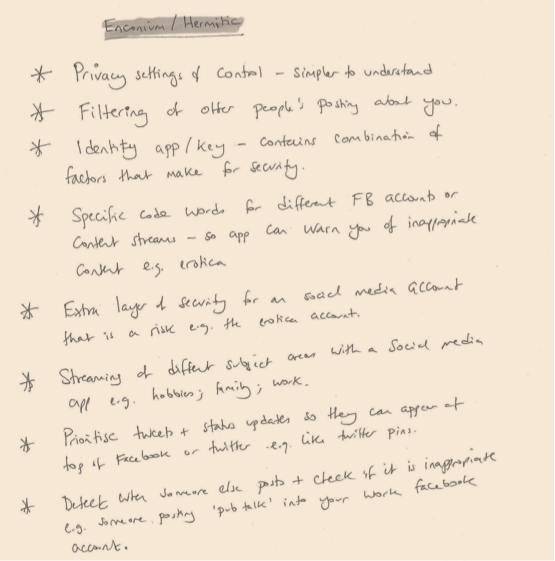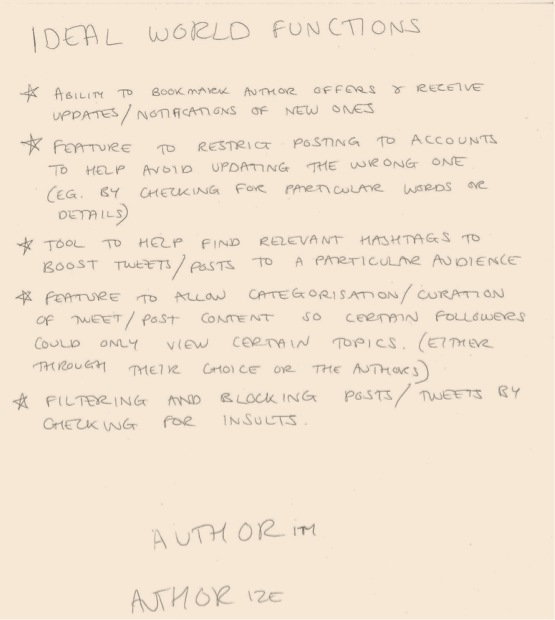Christina Emmanouil presents her research on the use by individuals of social networking sites for commercial purposes, for the Research Blog Series.
 Project: Designing for the commercial exploitation of online identity.
Project: Designing for the commercial exploitation of online identity.
Investigators: Christina Emmanouil with Professor Derek McAuley, University of Nottingham
What did your research aim to do?
Develop knowledge about the self- presentation practices of individuals who use social networking sites for commercial purposes and highlight design opportunities that emerge in support of these practices.
How did you do it?
By focusing on a case study of book authors to conduct three empirical studies, an online survey, an online observation, and two co-design workshops. Authors were selected as they represent a professional group with the potential to fully operate within the Digital Economy by using online publishing platforms to publish books and social networking sites to independently promote them.
What are your key findings?
– By comparing self-reported behaviours and observed online behaviours, and using established theories to interpret the discrepancy between the two, this project introduced Layered Identity Theory. This theory argues that regardless of whether it is intimate or not, every identity aspect has layers and only the inner layers convey information of a more personal nature.

Figure 1 – Identity Aspects by layers of information sensitivity, the more inner the layer the more personal the information it conveys.
– Another key finding is that some authors engage in a novel hybrid self-presentation as they use pen names to avoid links between their author selves and their personally identifiable life aspects and alter the information they share to prevent their mass audiences from knowing their real name identities. Strategies they employ to achieve this is use of nicknames for relatives, misstatement of location, and deliberate avoidance of identifiable information.
– Even though social networking sites lack features to fully support authors’ self-presentation, the creativity that characterises this group of professionals allows them to use these platforms in ways that partially fulfil their needs; yet remain challenging and need to be facilitated. Important tensions identified were:
• Managing multiple accounts in single platforms to separate professional and personal activities and risking sharing information via the wrong account
• Sharing outer layers of multiple aspects of their lives via their professional accounts to attract larger audiences and be noticed by publishers; something that blurs the focus of their profiles
• Managing to attracting large audiences and missing communication attempts or risking not fulfilling their expectations
Authors’ design recommendations were:

‘Encomium/Hermitic’ application features designed by authors.

‘AuthorIZE/AuthorTY’ application features designed by authors.
What impact has your work had so far/what impact do you anticipate it will have?
The findings could educate authors to avoid practices associated with tensions and inspire them to employ hybrid self-presentation. Layered Identity Theory could allow researchers more accurate categorisation of online information sharing.
Challenges encountered/Lessons learned
Recruiting authors for studies was hard and time-consuming. The cultivation of relationships between researchers and local communities that could give access to a potential pool of participants is strongly recommended.
Are there additional/new research questions still to be answered in this area?
Quantitative studies could generalise the findings for the wider population of the professional group under study. More professional groups could be studied and similarities that might emerge between different groups would work as input for the creation of a framework to describe the commercial exploitation of online identity. Research on how Layered Identity Theory applies to different professional groups could also be conducted.
How has your association with CREATe helped to take things forward?
The ‘All Hands Conference’ of CREATe allowed the familiarisation with the work of other researchers who worked on projects related to the Digital Economy and worked as a resource of ideas and creativity.
For more information see the PhD abstract, which includes the option to request a copy of the thesis.
